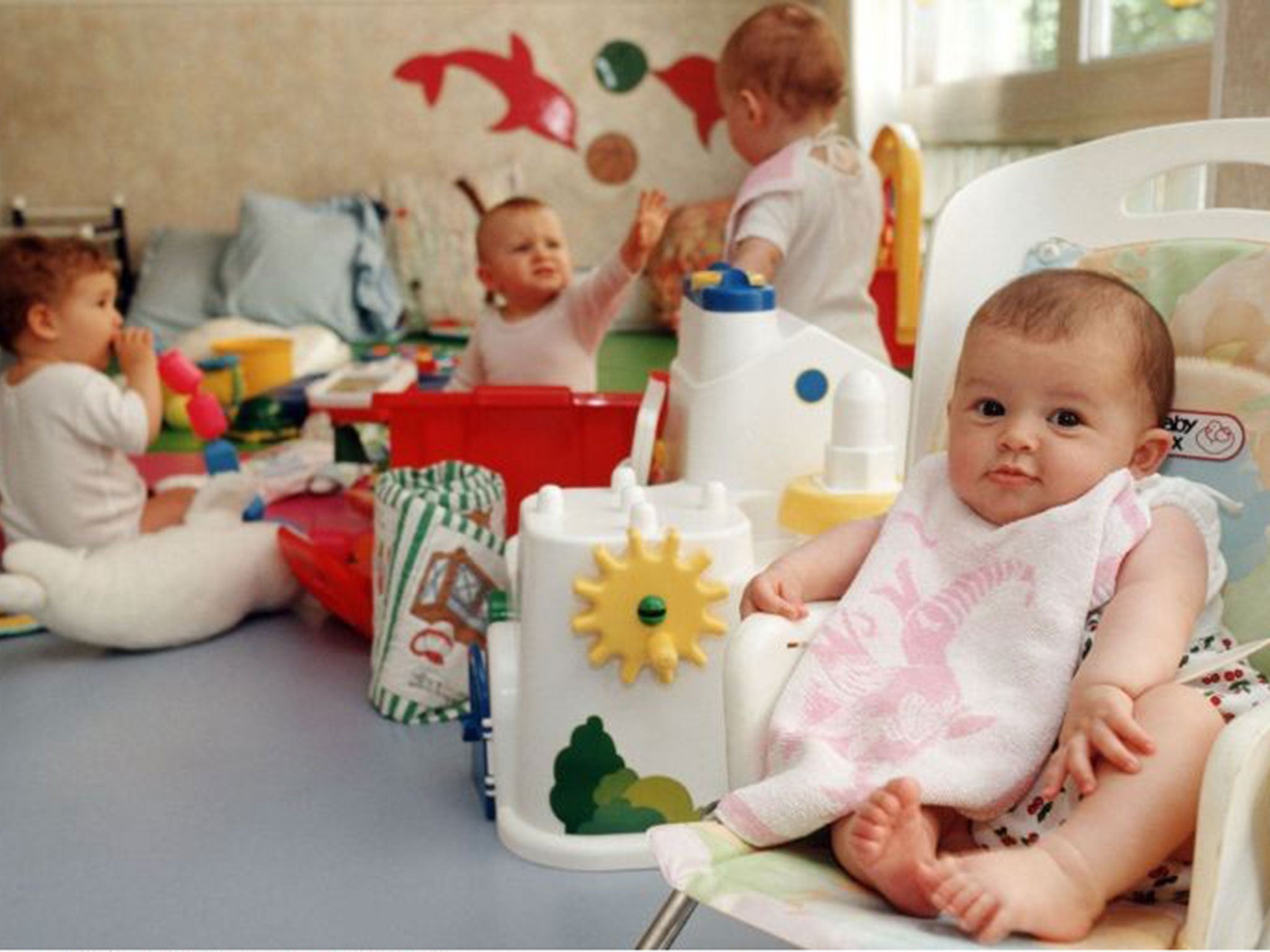Coalition 'way off track' on pledge to boost childcare
Almost 1.3 million under-fives live in areas with too few places, charity survey finds

Your support helps us to tell the story
From reproductive rights to climate change to Big Tech, The Independent is on the ground when the story is developing. Whether it's investigating the financials of Elon Musk's pro-Trump PAC or producing our latest documentary, 'The A Word', which shines a light on the American women fighting for reproductive rights, we know how important it is to parse out the facts from the messaging.
At such a critical moment in US history, we need reporters on the ground. Your donation allows us to keep sending journalists to speak to both sides of the story.
The Independent is trusted by Americans across the entire political spectrum. And unlike many other quality news outlets, we choose not to lock Americans out of our reporting and analysis with paywalls. We believe quality journalism should be available to everyone, paid for by those who can afford it.
Your support makes all the difference.Nearly 1.3 million children under the age of five in England and Wales are living in areas with insufficient childcare, including a lack of nursery places, new figures reveal.
Jill Rutter, the head of policy and research at the Family and Childcare Trust, warned last night that a "crisis" in affordable childcare is disproportionately hurting poorer families who are attempting to improve their lives. Those children living within local authorities with poor childcare provision represent more than a third of all under-fives in England and Wales.
Ms Rutter added that the trust's figures indicate that leaving childcare largely to the private sector is not working. There are many areas with relatively few young children where nurseries cannot turn a profit, so they set up elsewhere. Around 65 per cent of nurseries are run by the private sector and the situation is particularly acute in local authorities covering the east of England, Wales, the South-east, London and Wales.
"It is working families in deprived areas and in the countryside that are most affected by gaps in provision," said Ms Rutter, who is calling on the Government to punish local authorities that don't meet basic childcare requirements.
"Filling these gaps will need action and funding from the Government, but there is a much bigger cost to the public purse if parents can't work because they can't find childcare.
"This is a crisis in poorer areas, where struggling families are trying to get themselves out of poverty. If local authorities don't provide enough childcare they should be taken to task."
The Family and Childcare Trust figures will be used as part of a submission to a House of Lords inquiry into how childcare policies, including flexible working, can be developed to help families make sure their children are well looked after. In a presentation to the inquiry committee, led by crossbench peer Lord Sutherland of Houndwood, the trust called for a simpler childcare system, with free early education provided during school holidays.
The charity Working Families has made a submission warning that "the challenge of accessing appropriate, affordable childcare at the times they need it continues to limit parents' work opportunities".
Single parents and those with disabled children particularly struggle with the UK's rigid childcare system.
The charity added that there should be a greater onus on employers to help working families, such as providing childcare in benefits packages and partnering with councils to make school-holiday schemes accessible to their staff.
The scale of Britain's problem is revealed as the coalition struggles to hit targets over its key policy in the area, providing 15 hours of free early childcare and education for disadvantaged two-year-olds.
The Government promised that 130,000 such two-year-olds would receive the 15 hours of childcare by September 2013, and is doubling that number this year.
But with just one month to go until the target kicks in, the Government is more than 63,000 places short, according to Labour, following Freedom of Information requests.
Shadow Childcare minister Lucy Powell said this weekend that the coalition is "way off track" on meeting its pledge, with 44 per cent of councils lacking sufficient places. Even the initial 130,000 target has been missed by 14,000 places. Many councils are not expected to have enough provision until the second half of next year.
The political importance of childcare as a vote-winner has been shown in the run-up to next month's referendum on Scottish independence.
Childcare is devolved to the Scottish Parliament in Holyrood and free childcare for all three- and four-year-olds north of the border is being increased from 12 and a half hours to 15 hours this month. The Scottish National Party has claimed that it would double this to 30 hours if Scotland voted to break away from the Union.
A Department for Education spokesman said: "All councils have a statutory duty to secure sufficient childcare for working parents locally, and a duty to ensure that every eligible family that asks for a two-year-old early-learning place receives one.
"We're committed to ensuring that all children get the very best start in life. That's why our reforms have enabled more than 116,000 disadvantaged two-year-olds to access 15 hours of free childcare a week. This year we've expanded that offer to twice as many children, providing even more help to hard-working families.
"We've also worked to improve the quality of early education and childcare, and now nearly 90 per cent of providers delivering early-learning places are rated good or outstanding."
Join our commenting forum
Join thought-provoking conversations, follow other Independent readers and see their replies
Comments